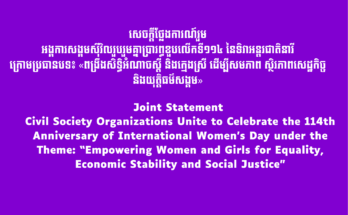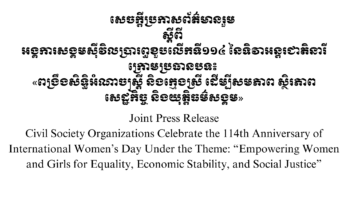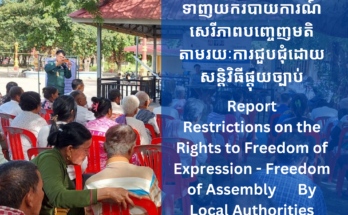 |
| ‘Brother Number Two’ delivers his statement to the court, 22 November 2011 |
Last week marked the beginning of substantive hearings in Case 002 at the Extraordinary Chambers in the Courts of Cambodia (ECCC), with opening statements from the co-prosecutors and the defence team. In this historic case three accused stand charged for their senior roles in the Khmer Rouge regime, during which approximately 1.7 million, almost one quarter of the population, were killed or died due to starvation or disease. Mr. Nuon Chea, “Brother Number Two”, chief ideologist and Pol Pot’s right-hand man; Mr. Ieng Sary, former Foreign Minister and Deputy Prime Minister; and Mr. Khieu Samphan, former head of State, are accused of crimes against humanity (including extermination, enslavement, torture, persecution), genocide (of the Cham and the Vietnamese), war crimes (including willful killing, torture, inhumane treatment) and other counts of crimes under Cambodian law (homicide, torture and religious persecution). The case appears comprehensive but due to time constraints and the magnitude of crimes investigated, it has been divided into ‘mini trials’, the first of which is limited to dealing with forced deportation (phase 1 and phase 2).
The co-prosecutors were allocated the first day and a half to open their case against the accused men. On Monday 21 November the national co-prosecutor Chea Leang delivered a thorough account of the history of the Khmer Rouge and the crimes that took place between 17 April 1975 and 6 January 1979. She detailed the specific crimes committed by the Khmer Rouge with a graphic description of the forced evacuation of Cambodia’s urban centers. These evacuations, the subject of the first trial, occurred in two massive waves, which followed shortly after the Khmer Rouge seized power on April, 1975.
After the National Co-Prosecutor Chea Leng had wrapped up her statement late on Monday afternoon, International Co-Prosecutor Andrew Cayley proceeded with an introduction to his account of the roles and responsibilities of the accused in the Khmer Rouge Regime, which he concluded on Tuesday. He spoke of Joint Criminal Enterprise, the legal provision under which the men are charged, and of them never getting blood on their own hands but making plans to shed blood for the cause. He outlined his belief that the defence will blame the dead for the crimes committed and the plans that were put in place. He countered Khieu Samphan’s claims that he was a mere figure head and did not have much of a role in central decision making, through reference to minutes from standing committee meetings evidencing that the former head of state was regularly present and had an active role in discussions. He referenced Nuon Chea’s “People’s Assembly” office, claiming that it was a faux institution that existed to give the impression of democracy. He alleged that in reality the People’s Assembly was another part of the killing apparatus and many orders to target individuals were initiated from here. Regarding Ieng Sary, Mr. Cayley made reference to the closing of the embassies abroad and the repatriation of Cambodian nationals who were convinced of prosperity in their home land, only to return to be imprisoned in labour or re-education camps. The prosecutor quoted Ieng Sary who travelled abroad to persuade young, educated Cambodians to return to their country: “I am very regretful for the deaths of the intellectuals as I was the one who gathered them to return.”
The prosecutors’ accounts were punctuated by requests from Ieng Sary’s defence team, firstly for permission to deliver a statement prior to the prosecutors’, and secondly to allow the accused, due to health issues, to follow the proceedings from a cell specially prepared below the courtroom. Both requests were denied by Nil Nonn, the President of the Trial Chamber. Nuon Chea’s defence intercepted at the beginning of the opening statement by Chea Leang, to announce to the court that an application had been filed for the disqualification of Judge Silvia Cartwright due to allegations that she participated in ex-parte meetings with the International Co-Prosecutor Andrew Cayley and Patricia O’ Brien, Undersecretary General for Legal Affairs and United Nations Legal Counsel, during Ms. O’ Brien’s recent trip to Cambodia. In response the President refused to entertain the matter further, claiming that Monday’s hearing was designated for the prosecution to present its case and that this should not be impeded.
The picture of Cambodia during the Khmer Rouge rule and the roles and responsibilities of the accused painted by the prosecution is strikingly different to that illustrated by the defence. The accused men claim that they acted for the good of the Cambodian people, out of patriotism and ideology. Nuon Chea’s statement strove to place the blame elsewhere. He professed his love for the Cambodian people and cited the US bombings and Vietnam’s alleged attempts at invasion as reasons for the events that took place between 1975 and 1979. He gave a detailed analysis of the history of the Vietnamese threat to Cambodia, which he claimed forced the Khmer Rouge into power and necessitated their harsh tactics. He concluded by pointing to examples of how Vietnam continues, even today, to attempt to invade and occupy Cambodian territory and destroy the Khmer people.
Similar to ‘Brother Number Two’, former Head of State Khieu Samphan also mentioned the blanket bombing of Cambodia by US forces during the Vietnam War: “These bombs outnumbered the bombs the alliance used during all of the Second World War everywhere, including the two big bombs dropped on Hiroshima and Nagasaki,” he said, before describing the brutality of Lon Nol’s US-aligned government before the Khmer Rouge seized power in 1975. Khieu Samphan’s statement attacked the Prosecution’s case against him for relying largely on evidence taken from books and journalist accounts, which he claimed were intangible. He criticized International Co-Prosecutor, Mr. Cayley for his “fairytale” account of history; adding that communism, despite seeming like a joke to Mr. Cayley, at the time provided genuine hope to millions of people. He raised the point that King Sihanouk shared equal responsibility to his for the events that unrolled during the Khmer Rouge Regime and questioned the Prosecution’s failure to call him to the dock. Once again Khieu Samphan emphasized the complicated hierarchy within the Khmer Rouge, claiming his role was mainly as a figurehead, and that he did not take part in the crucial decision making which lead to many of the above-mentioned crimes.
Ieng Sary, who had to be assisted to the stand and struggled through his page and a half-long statement, highlighted the fact that he had been granted an amnesty by the joint prime ministers in 1996, and that the King had granted him a royal pardon and amnesty which should protect him from being prosecuted. He seemed disinterested in the speech made by Mr. Cayley, not wearing his headset despite the fact that the speech was in English, a language Ieng Sary claims not to speak. When asked would he give any testimony during evidence hearings the defendant replied that he would not, provoking disdain amongst some of the Civil Parties.
Looking ahead to next week’s scheduled evidence hearings (December 5th to 10th), amidst all the furor and hype surrounding the court and the antics from all sides, we must not neglect the victims; those who had their lives and families devastated by the regime and who will not rest until justice is delivered. The Khmer Rouge Tribunal has been upheld for its unprecedented policy on the participation of victims, granting them rights as Civil Parties to the trial, thereby reflecting Cambodia’s civil law system. However, alterations to internal rules have progressively chipped away at the rights of victims to participate in hearings. It therefore remains to be seen whether meaningful participation of victims, the type that renders them Civil Parties, is still possible based on such restrictions. The severance order issued by the courts which limits the first ‘mini trial’ to the crime of forced transfers excludes 75 percent of victims who were not affected by this Khmer Rouge policy. In addition, the first week of opening statements did not include input from the Civil Party Lawyers. They were denied a request to be permitted to make preliminary remarks lasting 30 minutes and their participation was extremely limited. We must hope that in the coming weeks, in living up to initial promises by the court founders, the Civil Parties are given the voice that they deserve.
The unorthodox statements by the accused, the limited participation of Civil Parties and the theatrics at times employed at the court highlight the controversy and ambiguity that has surrounded the ECCC since its beginnings. The defence will undoubtedly continue to raise such issues and employ such tactics to argue that the trial is an unfair one. Unfortunately the limitations placed on the first trial and the advanced ages of the three men could mean that, after all the protocol and delay, justice may remain out of reach. ‘Brother Number Two’ delivers his statement to the court, 22 November 2011



